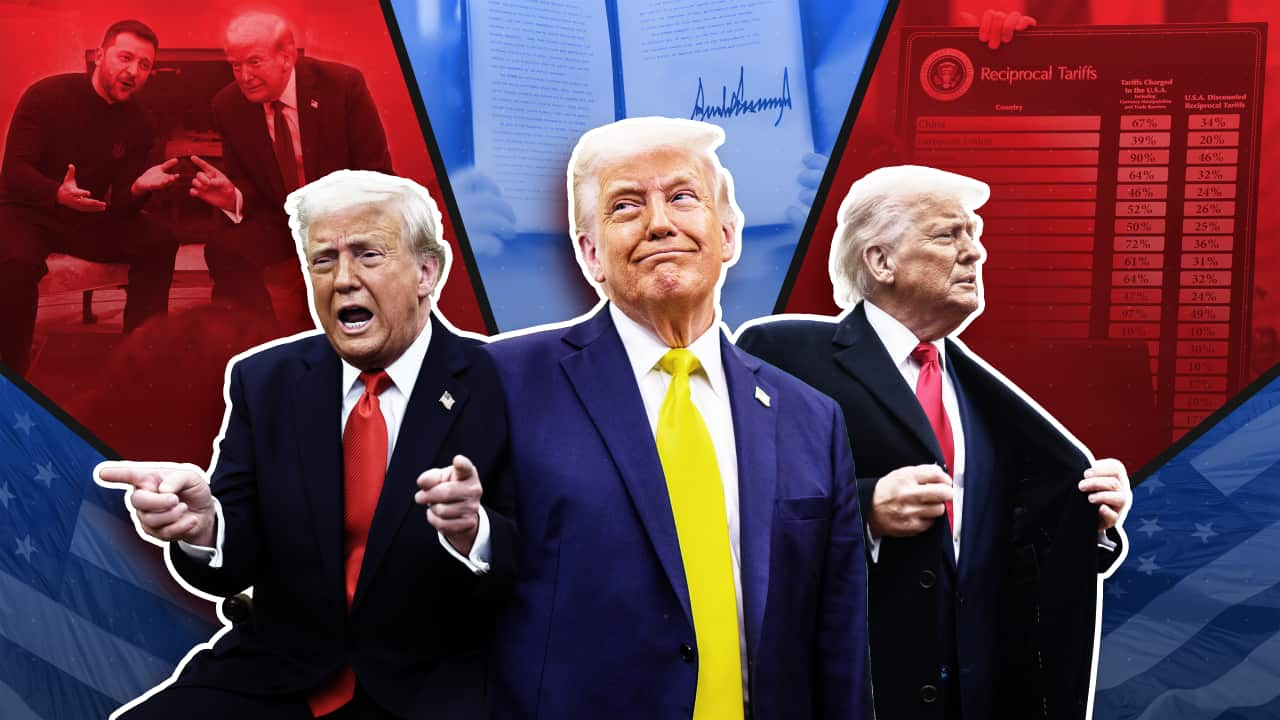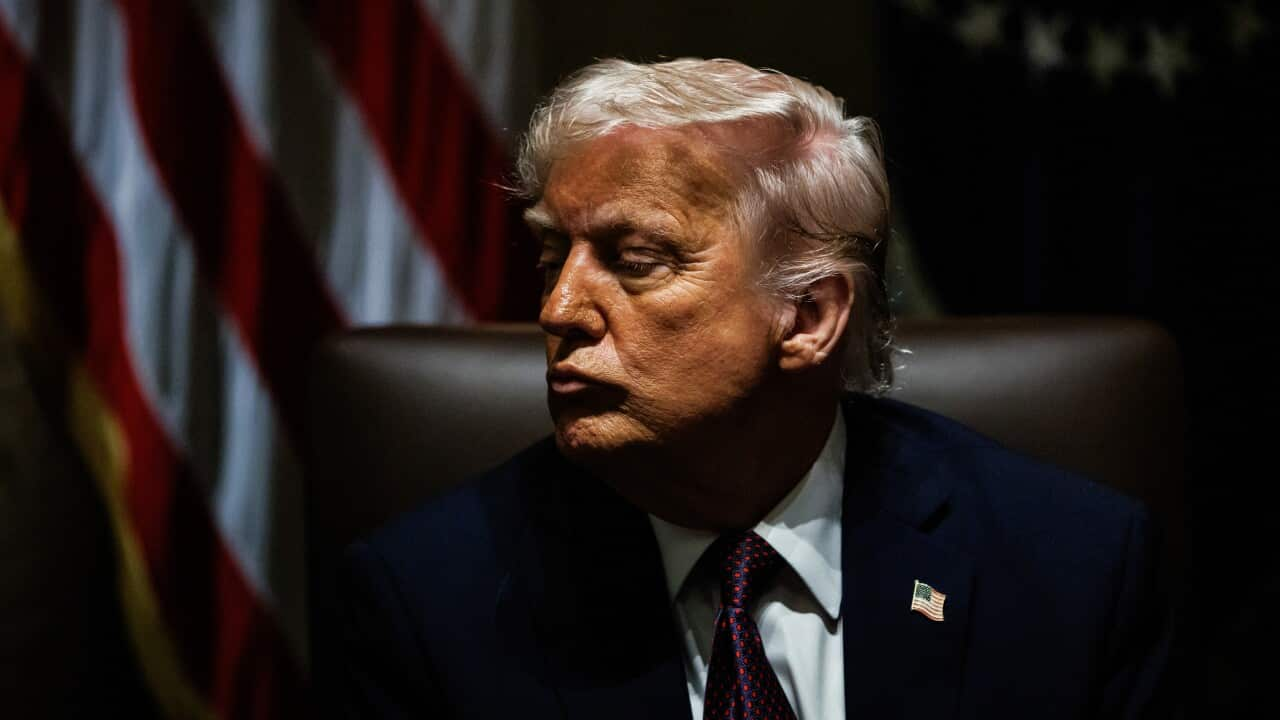On the eve of his inauguration, Donald Trump addressed a crowd of supporters at a rally in downtown Washington.
"The American people have given us their trust and in return we are going to give them the best first day, the biggest first week and the most extraordinary 100 days of any presidency in American history," he said on 19 January.
On his first day as president of the United States, Trump signed 26 executive orders.
Within a week, that number totalled 40.
Now, 100 days into his second term in office, 143 executive orders have been signed, according to the American Presidency Project.
From releasing rioters accused of storming the Capitol to controversial tariffs, cracking down on immigration and improving water pressure to "make America's showers great again", Trump has signed more executive orders than any other US president over the same period.
Only sitting presidents can sign , which are directives to government agencies on how to implement the law. Only the president has the power to overturn them, although they can be challenged by the courts.
But while Trump has been on an executive order-signing spree, he has signed just five bills — made and passed in Congress — into law, according to an analysis by US outlet NBC News. That compares to 11 signed by Joe Biden during his first 100 days in 2021, and 30 signed by Trump during his first term in 2017.
William Galston, a senior fellow in governance studies at the Brookings Institution think tank, told the media outlet he believes this is the case because when the Trump administration was waiting in the wings, it had planned a "whirlwind of activity" that was "compatible only with executive action".
"He hasn’t signed many bills into law because the agenda of the first 100 days has not been a legislative agenda at all,” Galston told NBC News.
Jared Mondschein, director of research at the University of Sydney's United States Studies Centre, told SBS News: "The key thing with executive orders is that just as easily as they can be signed, they can also be revoked by the subsequent president.
"What actually stays is legislation that is passed into law. And Donald Trump thus far has really not passed any legislation."
For Wesley Widmaier, a US-born professor of international relations at the Australian National University (ANU), this style of governance is at odds with 80 years of Western diplomacy.
"People underestimate Trump and they see him as lacking in strategic acumen," Widmaier said. "He just lacks their strategic acumen and their strategic sensibility."
What comes next?
While the US midterm election feels "a million years away" to Widmaier, he believes Trump's early performance may be an effort to solidify his power in Congress.
The midterms, held two years after a presidential election, decide the make up of Congress. The next is scheduled for 3 November 2026, and the Democrats will be hoping to win control of the Senate, the House — or both. The Republicans currently hold a slim majority in both chambers.
According to Widmaier: "Trump knows what's going to happen. He's not going to do well in the midterms, so it's another reason for him to move fast."
Polling averages published by The New York Times show Trump's approval rating has fallen 8 points from 52 per cent at his inauguration to 44 per cent. One poll, conducted by market research firm SSRS for CNN, suggested the Republican president's approval rating in the first 100 days was lower than other predecessors from the past seven decades. Trump is critical of these polls and said, without evidence, that they are "fake" while at a rally outside Detroit, Michigan on Monday (local time).
Others polls have suggested the Democrats are struggling to surmount the Republicans. A Harvard CAPS/Harris poll in April said support for the party had returned to November 2024 levels (42 per cent) — when Trump won the presidential election — but remained 9 points behind the Republican Party which had an approval rating of 51 per cent.
SBS News asked Emma Shortis, director of the Australia Institute’s International and Security Affairs Program, whether public perception influences Trump's politics.
"I’m not sure there is that straightforward relationship between Trump’s unpopularity and what will happen in the midterm elections," Shortis said.
She added: "We can’t underestimate just how divided the American electorate is ... and Trump didn’t invent that situation but he is certainly the best in living memory to exploit it."
Controversies and low job approval ratings
On his first day back in office, Trump pardoned approximately 1,500 people who in 2021, resulting in five deaths and over $2 million in damages.
In early April, he slapped on almost every country in the world — although days later he announced that would give exporters from many countries after the move that .

US President Donald Trump as he announced tariffs on trading partners across the world. Source: Getty / Chip Somodevilla
A three-day Reuters-Ipsos poll, completed on Sunday, suggested discontent is rising over Trump's handling of the economy and hardline approach to immigration, amid concern about a global trade war and a push to increase deportations.
Some polls have found Trump's stance on immigration is among his most favourably-viewed policies, including that by Reuters-Ipsos — although it did find disapproval on this front had ticked 2 points higher to 48 per cent, while 45 per cent of respondents approved.
Mondschein said: "Trump may have low public approval ratings, but on a number of issues he actually is far better than he did in his first term."
"So he's doing worse ... on the economy, but he's doing exceptionally well on immigration, which as controversial as his practices have been ... continue to be one of his few areas where he has broad public support."
Playing to the press?
If the past is any indicator, Modschein believes Trump will continue to engage with social media and influencers in favour of conventional mainstream media.
"Mainstream media has never been less powerful ... he [Trump] is willing to engage with less conventional media outlets more than anyone else."
Trump has made friends with Elon Musk — who — and podcaster Joe Rogan who rooted for him during the 2024 presidential campaign. Both addressed Trump's supporters after he won the election.
Musk has 220 million followers on X, which he owns. Rogan has over 14 million subscribers on Spotify — 28 times larger than CNN's average primetime viewership. Although, in recent weeks, media reports have suggested a growing distance between Trump and Rogan.
The US president also made headlines with Ukrainian President Volodymyr Zelenskyy on 28 February.
"This is going to make great television," Trump said at the end of the explosive meeting.

The interim leader of the Department of Government Efficiency (DOGE) even brought his son “Lil X” to listen in. Source: AP / Alex Brandon
Expert say it's hard to predict who will make the next guest appearance.
But in his 2016 biography, Great Again, Trump admitted he has a history of playing the press.
"I use the media the way the media uses me — to attract attention," Trump wrote.


